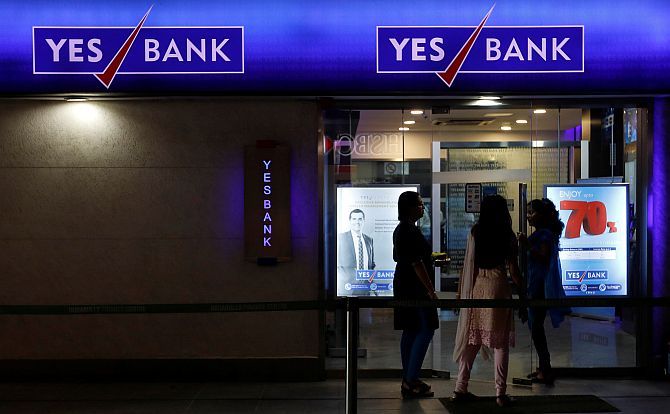The scrip was the worst hit among the front-line companies on both the indices during the day.

Shares of Yes Bank slumped nearly 30 per cent on Tuesday after the company reported a loss of Rs 1,506.64 crore for the fourth quarter ended March 31, owing to rise in provisioning for bad loans.
The scrip tanked 29.23 per cent to close at Rs 168 on the BSE.
During the day, it plummeted 30.37 per cent to Rs 165.30.
At the NSE, shares cracked 29.70 per cent to close at Rs 166.75.
The scrip was the worst hit among the front-line companies on both the indices during the day.
The company's market valuation plunged by Rs 16,048.56 crore to Rs 38,909.44 crore on the BSE.
"Yes Bank opened gap down and fell over 29 per cent today as the street is unhappy with the quarterly numbers which reported a massive net loss of Rs 1,507 crore on the back of provisions which rose nearly seven times," said Umesh Mehta, head of research, Samco Securities Ltd.
In terms of traded volume, 206.47 lakh shares were traded on the BSE and over 21 crore shares on the NSE during the day.
Markets were closed on Monday due to elections in Mumbai.
The bank had recorded a net profit of Rs 1,179.44 crore on standalone basis during January-March period of 2017-18, it said in a regulatory filing on Friday.
The bank's total income rose to Rs 8,388.38 crore as against Rs 7,163.95 crore in the same quarter of the previous fiscal, the bank had said in the filing.
On the asset quality front, gross non-performing assets (NPAs) of the bank doubled to 3.22 per cent of the gross advances as on March 31, 2019 from 1.28 per cent at the end of 2017-18.
Yes Bank's balance sheet clean-up will be painful
The balance sheet clean-up by Yes Bank will strain its profitability in the next 12-18 months as it makes provisions for stressed assets, Moody's Investors Service said on Tuesday.
On April 26, the bank reported its first-ever quarterly loss since its inception in 2004 at Rs 1,506 crore in the January-March quarter.
Nevertheless, the bank is profitable on a full-year basis, with a return on assets of 0.5 per cent as of March 31, 2019, as against 1.4 per cent a year ago.
"We estimate that the bank's overall stressed assets are about 8 per cent of its gross loans... The balance sheet clean-up will strain the bank's profitability in the next 12-18 months as it provides for the stressed assets," Moody's said in a report.
The March quarter loss of Yes Bank was driven by higher credit costs for non-performing loans (NPLs) and the creation of a contingent provision against a pool of identified stressed assets.
"Despite near-term weakness, we expect the change in corporate behaviour under new bank leadership will be credit-positive after the de-risking is complete," Moody's said.
In late-January this year, the bank appointed Ravneet Gill as its managing director and chief executive officer (CEO), after the Reserve Bank of India restricted the bank's founder and long-time managing director and CEO Rana Kapoor's term until January 2019.
In the next three financial years, the bank may slow loan growth to about 20-25 per cent annually, compared with an average loan growth of 34 per cent a year between 2013-14 and 2018-19, Moody's said.
"The bank will increase the focus on the retail segment and small- and medium-sized enterprises and reduce dependence on corporate lending," Moody's said.
It added that a reduction in loan concentration to large corporate groups will be credit-positive, as these types of loans have lent volatility to the bank's asset performance in the recent years.
The bank's board has approved an equity capital raising plan of up to $ 1 billion, which, once complete, will help improve loss-absorbing buffers while supporting asset growth, it added.
The lender's gross non-performing assets (NPAs) doubled to 3.22 per cent of loans as on March 31, 2019, from 1.28 per cent at the end of March quarter in 2017-18.
At the end of March 2019, the bank's tier-I equity capital ratio was 8.4 per cent, compared with 9.7 per cent at the end of March 2018.
Photograph: Danish Siddiqui/Reuters











 © 2025
© 2025